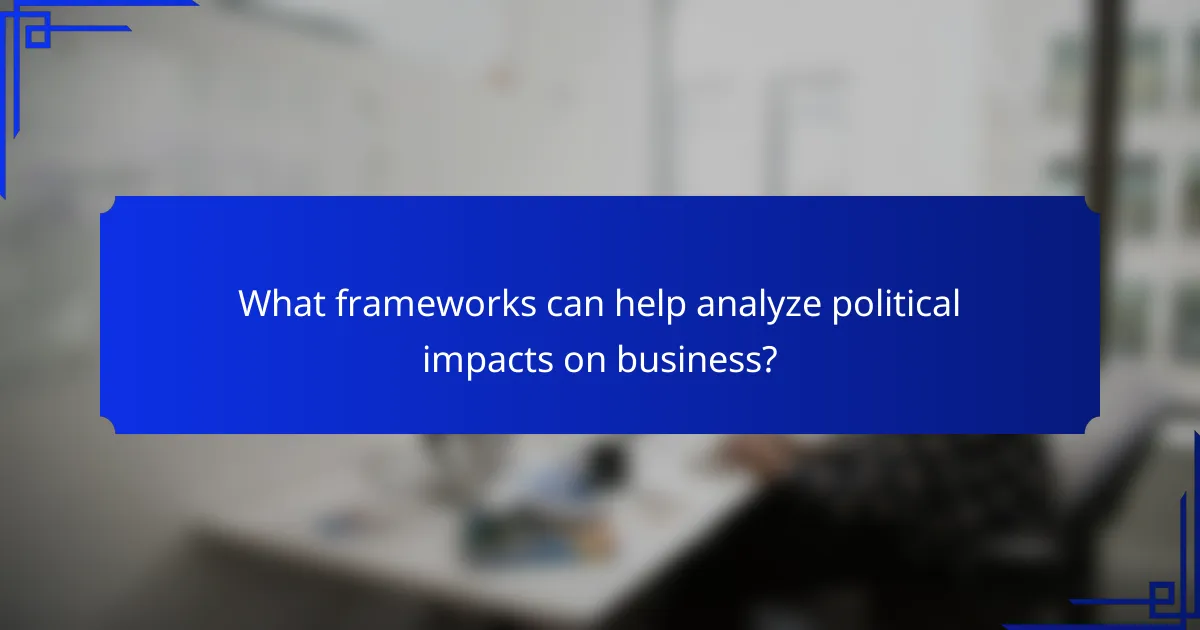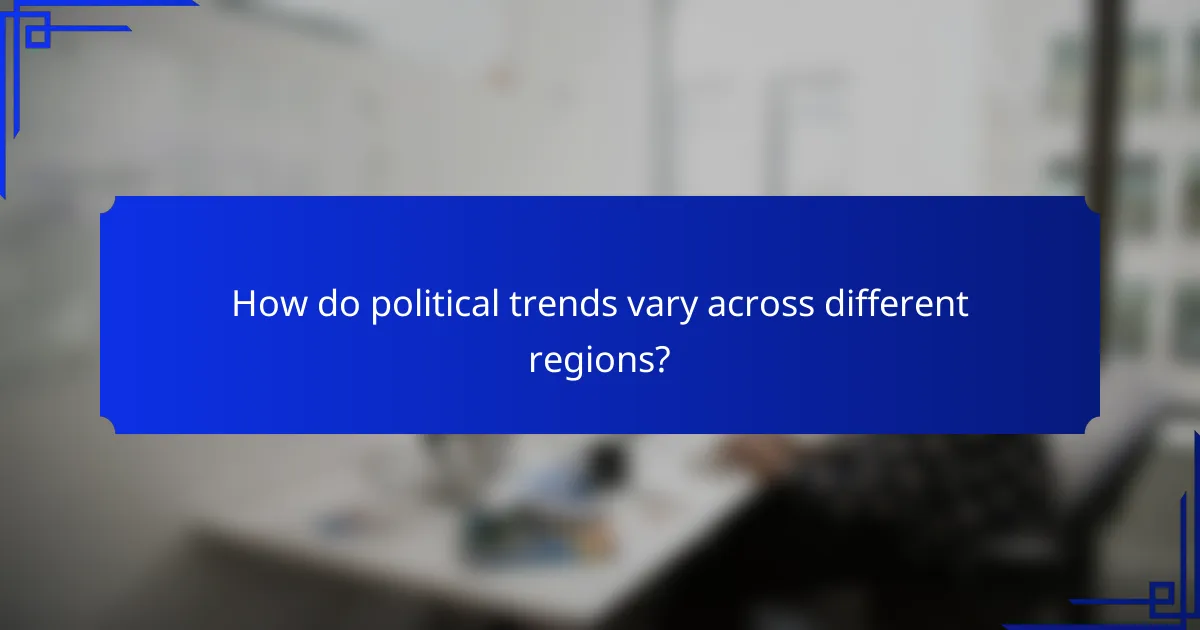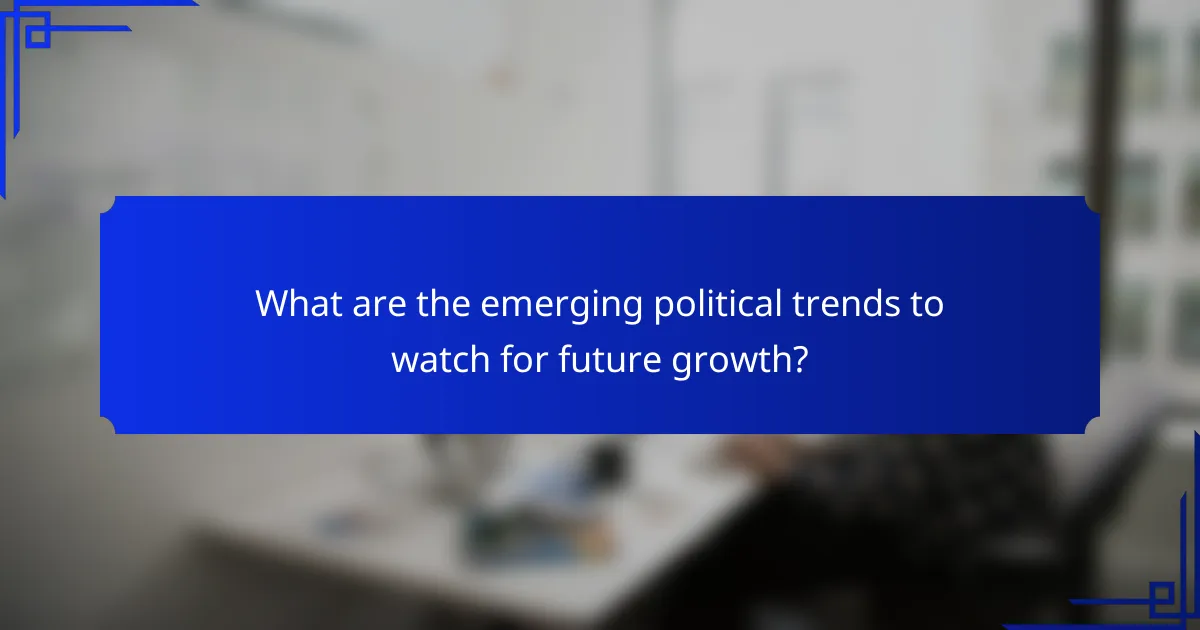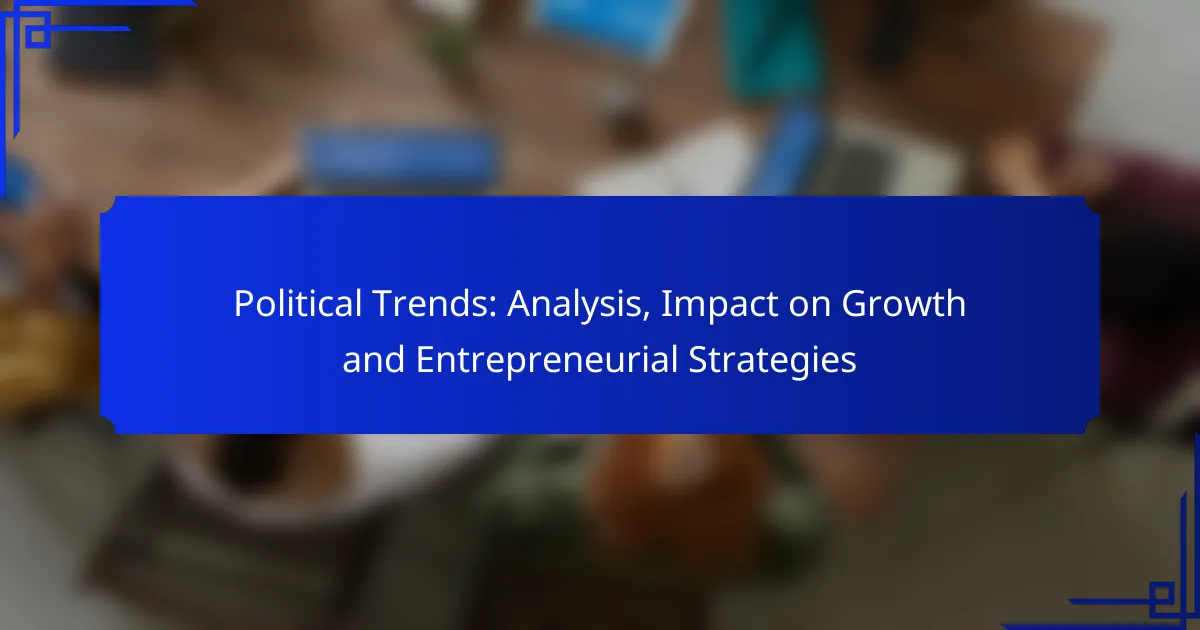Political trends play a crucial role in shaping entrepreneurial strategies and influencing economic growth. In 2023, factors such as the rise of populism, a heightened focus on sustainability, and technological regulation are driving changes in market dynamics. Entrepreneurs must remain adaptable and proactive, engaging with policymakers and adjusting their business models to navigate these evolving landscapes effectively.

How do political trends affect entrepreneurial strategies in the United States?
Political trends significantly shape entrepreneurial strategies in the United States by influencing regulatory environments, market stability, and consumer behavior. Entrepreneurs must adapt their approaches to navigate these changes effectively.
Impact of regulatory changes
Regulatory changes can create both opportunities and challenges for entrepreneurs. For instance, new tax incentives may encourage startups in certain sectors, while increased compliance requirements can raise operational costs.
Entrepreneurs should stay informed about local, state, and federal regulations that impact their industries. Engaging with industry associations can provide insights into upcoming changes and help businesses adapt proactively.
Influence of political stability
Political stability is crucial for fostering a favorable business environment. A stable political climate typically encourages investment and growth, while instability can lead to uncertainty, making it harder for entrepreneurs to secure funding and plan for the future.
Entrepreneurs should assess the political landscape when considering expansion or investment. Monitoring political developments can help identify potential risks and opportunities in the market.
Shifts in consumer sentiment
Political trends often influence consumer sentiment, which can directly affect entrepreneurial strategies. For example, during election years, consumer confidence may fluctuate, impacting spending patterns and demand for products or services.
Entrepreneurs should conduct regular market research to gauge consumer attitudes and adjust their marketing strategies accordingly. Understanding the political context can help businesses align their offerings with evolving consumer preferences.

What are the key political trends influencing growth in 2023?
In 2023, key political trends such as the rise of populism, increased focus on sustainability, and technological regulation are significantly influencing economic growth. These trends shape entrepreneurial strategies and impact market dynamics across various sectors.
Rise of populism
The rise of populism in many countries is reshaping political landscapes and economic policies. Populist leaders often prioritize national interests, which can lead to protectionist measures that affect international trade and investment.
Entrepreneurs should be aware of potential shifts in regulations and tariffs that could impact their supply chains and market access. For instance, businesses may need to adapt to changing trade agreements or localize their operations to align with nationalistic policies.
Increased focus on sustainability
In 2023, sustainability has become a central theme in political discourse, influencing both consumer behavior and corporate strategies. Governments are implementing stricter environmental regulations, which can drive innovation in green technologies and sustainable practices.
Businesses should consider integrating sustainable practices into their operations to meet regulatory requirements and consumer expectations. This could involve adopting renewable energy sources, reducing waste, or developing eco-friendly products to stay competitive in a growing market focused on sustainability.
Technological regulation
Technological regulation is increasingly prominent as governments seek to address concerns over data privacy, cybersecurity, and the ethical use of artificial intelligence. These regulations can create both challenges and opportunities for businesses in the tech sector.
Entrepreneurs should stay informed about emerging regulations that could impact their technologies and business models. Compliance with data protection laws, such as GDPR in Europe, is crucial, and companies may need to invest in robust security measures to protect user data and maintain trust.

How can businesses adapt to changing political landscapes?
Businesses can adapt to changing political landscapes by being proactive in their strategies and remaining flexible. This involves understanding political trends, engaging with policymakers, and adjusting business models to mitigate risks and seize opportunities.
Implementing flexible business models
Flexible business models allow companies to quickly respond to political changes, such as new regulations or shifts in government priorities. For instance, a business might adopt a subscription model that can easily adjust pricing or services based on market conditions.
Consider incorporating agile methodologies that enable rapid iteration and adaptation. This can involve regular assessments of political risks and opportunities, ensuring that your business can pivot when necessary.
Engaging in policy advocacy
Engaging in policy advocacy helps businesses influence legislation that affects their operations. This can include joining industry associations or lobbying groups that represent your interests at the local or national level.
Effective advocacy requires building relationships with policymakers and understanding the political landscape. Companies should communicate their positions clearly and provide data to support their arguments, demonstrating how proposed policies can benefit both the business and the community.
Diversifying markets
Diversifying markets can protect businesses from political instability in any single region. By expanding into multiple countries or sectors, companies can reduce their reliance on one market and mitigate risks associated with political changes.
When considering market diversification, evaluate factors such as political stability, regulatory environments, and economic conditions. For example, businesses might explore emerging markets in Southeast Asia or Eastern Europe, where growth potential may be higher despite political uncertainties.

What frameworks can help analyze political impacts on business?
Frameworks like PESTLE and SWOT analysis are essential for understanding how political factors influence business operations and strategies. These tools help identify risks and opportunities stemming from political environments, enabling companies to adapt effectively.
PESTLE analysis
PESTLE analysis examines Political, Economic, Social, Technological, Legal, and Environmental factors affecting a business. This framework helps organizations assess how government policies, regulations, and political stability can impact their operations.
For example, a company entering a new market should analyze local political conditions, such as trade agreements or tariffs, which can significantly affect costs and market access. Regularly updating this analysis can help businesses stay ahead of potential regulatory changes.
SWOT analysis
SWOT analysis focuses on identifying Strengths, Weaknesses, Opportunities, and Threats related to a business. When considering political impacts, organizations should evaluate how political factors can create opportunities or pose threats to their strategic goals.
For instance, a favorable political climate may present opportunities for expansion, while political unrest could threaten existing operations. Businesses should regularly conduct SWOT analyses to remain agile and responsive to changing political landscapes.

How do political trends vary across different regions?
Political trends can significantly differ across regions due to varying cultural, economic, and regulatory environments. These differences influence how businesses adapt their strategies and respond to changes in governance and policy.
Comparison of urban vs rural responses
Urban areas often exhibit more progressive political trends, leading to quicker adoption of new policies and technologies. In contrast, rural regions may be more conservative, with slower responses to political changes, reflecting traditional values and economic structures.
For example, urban entrepreneurs might embrace sustainability initiatives driven by local governments, while rural businesses may prioritize agricultural subsidies and land use regulations. Understanding these distinctions is crucial for tailoring business strategies effectively.
State-specific regulatory environments
Each state can have unique regulatory frameworks that impact business operations, from tax incentives to labor laws. For instance, states like California may enforce stringent environmental regulations, while Texas might offer more business-friendly policies.
Entrepreneurs should assess the regulatory landscape in their specific state to identify opportunities and challenges. A checklist of considerations includes local tax rates, compliance requirements, and available grants or incentives that can influence growth strategies.

What are the emerging political trends to watch for future growth?
Emerging political trends significantly shape future growth by influencing economic policies, market stability, and entrepreneurial opportunities. Key trends include global geopolitics, evolving trade policies, and the rise of social movements, all of which can create both challenges and opportunities for businesses.
Impact of global geopolitics
Global geopolitics affects economic growth by altering trade relationships, investment flows, and regulatory environments. For instance, tensions between major economies can lead to sanctions or tariffs, which may disrupt supply chains and increase costs for businesses.
Entrepreneurs should monitor geopolitical developments closely, as these can create new markets or diminish existing ones. Understanding the political landscape can help businesses adapt their strategies to mitigate risks and seize opportunities.
Shifts in trade policies
Changes in trade policies, such as tariffs and trade agreements, directly impact market access and competitiveness. Countries may adopt protectionist measures that can limit imports, affecting pricing and availability of goods.
Businesses should stay informed about trade negotiations and policy shifts, as these can influence sourcing strategies and pricing models. Engaging with trade associations or industry groups can provide valuable insights into upcoming changes and their potential impacts.
Influence of social movements
Social movements increasingly shape political agendas and can drive changes in regulations and consumer preferences. Movements advocating for sustainability, equality, and corporate responsibility are prompting businesses to adapt their practices to remain relevant.
Entrepreneurs should consider aligning their strategies with social trends to enhance brand loyalty and attract customers. Ignoring these movements can lead to reputational risks and lost market share, making it essential to integrate social considerations into business planning.

How can businesses leverage political trends for competitive advantage?
Businesses can gain a competitive edge by closely monitoring and adapting to political trends that align with their goals. By understanding the political landscape, companies can tailor their strategies to resonate with consumers and stakeholders, ultimately driving growth and enhancing brand loyalty.
Aligning brand values with political issues
Aligning brand values with political issues involves integrating relevant social and political themes into a company’s mission and messaging. This alignment can foster deeper connections with consumers who prioritize corporate social responsibility and ethical practices.
To effectively align with political issues, businesses should first identify the causes that resonate with their target audience. For instance, a company focused on sustainability might advocate for environmental policies, while a tech firm could support digital privacy regulations. This alignment not only enhances brand image but also attracts customers who share similar values.
However, companies must tread carefully to avoid backlash. Misalignment or perceived opportunism can alienate consumers. It’s crucial to engage authentically with the issues and ensure that actions match the stated values. Regularly assessing public sentiment and adjusting strategies accordingly can help maintain relevance and trust.
